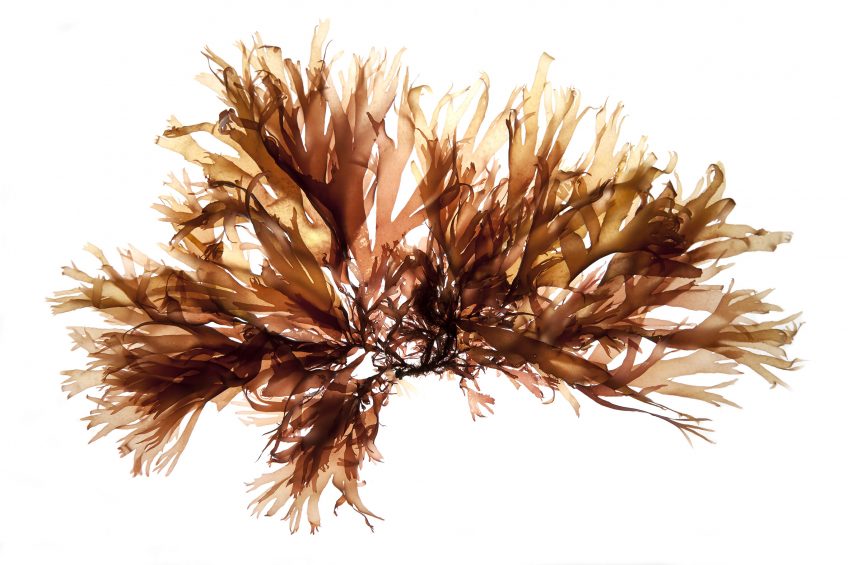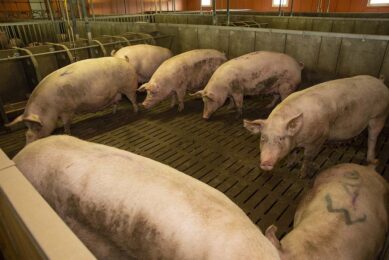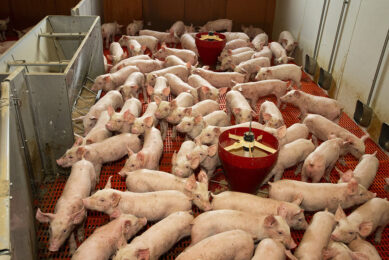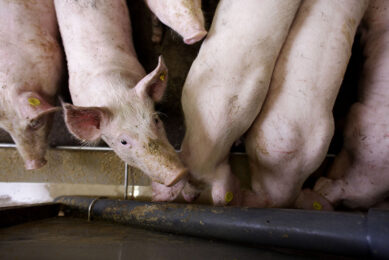Algae extracts to improve piglet gut health

At what moment does a piglet need help? At weaning or does protection have to start sooner? Applying a strategy which includes macro-algae starts at day 5 after birth and it has promising results for controlling diarrhoea.
All pig producers understand the importance of ‘hitting the ground running’ when it comes to raising pigs, especially those working in the farrowing unit. Day one pig care is a hot topic, and is constantly being adjusted and improved upon. But what about the remaining roughly 20 days in the farrowing unit? With such a naïve immune system, nursing piglets are prone to intestinal disorders that result in diarrhoea.
This can be especially risky at such a young age as it doesn’t take much water loss for them to become dehydrated, quickly leading to decreases in growth. Additionally, with the density of pigs in modern farrowing units, if one litter breaks with an intestinal disorder, the likelihood of the remaining litters breaking is exponentially higher.
Thus, it is in a producer’s best interest to decrease the incidence of intestinal disorders occurring as much as possible. Understanding this, producers have often turned to using antibiotics to assist with keeping healthy piglets. Unfortunately, with the increasing incidence of antibiotic resistance, alternatives must be found. One such alternative is seaweed, or marine macro-algae.
Marine macro-algae
Marine macro-algae are eukaryotic, pluricellular organisms that are divided into three distinct groups:
• Green algae;
• Red algae; and
• Brown algae.
The interest in using marine macro-algae to improve pig health and performance, stems from the different biological activities that macro-algae has on animal physiology. These biological activities, including antibacterial activity, antiviral activity, and increased mucus secretion, are caused by different types of algae sulfated polysaccharides found within macro-algae. These sulfated polysaccharides are branched polysaccharides that contain different types of sugar molecules (i.e. glucose, rhamnose, xylose, etc.) with differing degrees of sulfation.
The degree of sulfation and size of the molecule influence the type of activity the compound has. Additionally, each type of algae contains specific types of sulfated polysaccharides. Therefore, if producers or researchers are trying to benefit from feeding a specific sulfated polysaccharide within marine macro-algae, it is important that a purified version of the compound be used rather than the raw material, to ensure the desired effect is achieved.
Stimulating mucus production in the GIT
As previously mentioned, one of the types of biological activities associated with a specific algae sulfated polysaccharide is stimulating mucus production in the swine gastro-intestinal tract. This has caused it to receive increased attention as a mechanism to improve pig performance and gut health.
This algae sulfated polysaccharide is known under the brand name MSPMUCIN, and preliminary research has shown that it acts directly on the goblet cells of the intestine to stimulate mucus production; goblet cells are one of the small intestine epithelial cells that produce mucus.
The mucus secreted by goblet cells contributes to creating a mucus layer along the length of the intestine. This layer serves as a protective barrier over the epithelium and limits the ability of different pathogenic micro-organisms to reach the epithelial cells and be absorbed, thereby limiting their impact on the animal. By being able to improve the mucosal barrier function, via increased mucus secretion, pig producers may be able to keep pigs healthier while decreasing antibiotic use.
Recognising the benefit that providing producers with the purified form of the algae sulfated polysaccharide may have on pig performance and health, Olmix created a product that combines this marine sulphated polysaccharide and clay (specifically processed to increase intestinal coating capacity) for use with nursing pigs. The product was designed specifically for nursing pigs as their immune system is underdeveloped at birth, causing them to rely on the passage of maternal immunity via colostrum.
This, in combination with a still developing gastro-intestinal tract, make them highly susceptible to gastro-intestinal disturbances and diarrhoea. Therefore, the company wanted to provide a product to help manage issues starting in the farrowing house, to ensure pigs are weaned healthy and strong. The product that was created, Ecopiglet**, is to be used starting at day 5 to decrease diarrhoea incidences and antibiotic usage in nursing piglets.

Decreasing antibiotics
In a recent study, the company provided 36 litters (393 piglets) with the new product at 50g per litter, twice a day, from five days after farrowing until weaning. A control group of 36 litters (400 piglets) was used in order to compare the effectiveness of the product. Adding this strategy decreased both the incidence of diarrhoea and medication use (P<0.05). the product has the ability to help keep nursing piglets healthier and decrease the usage of antibiotics.>
These results demonstrate that using MSPMUCIN will improve nursing piglet health and decrease antibiotic usage. However, it is also vital that the product perform well in a challenge setting, especially one involving a known gastrointestinal disease.
Given this, the company set out to determine the impact that the algae sulfated polysaccharide would have on nursing piglet performance and mortality in a barn that tested positive for Porcine Epidemic Diarrhoea virus (PEDv). This virus is one of the most detrimental diseases in the farrowing unit, causing nearly 95% mortality in nursing piglets. There is no cure for PEDv and the virus is highly recombinant, making vaccine development difficult. As such, the main strategy for dealing with a PEDv is to inoculate the sows and treat the symptoms, and minimise the inevitable losses as much as possible.
The devastating effect that PEDv has on nursing piglets stems from the fact that the virus causes widespread enterocyte lysis, resulting in severe villi atrophy and crypt lengthening. This causes decreased nutrient absorption, watery diarrhoea, dehydration, depression, and vomiting. In an older pig, the impact of the virus is less severe, compared to nursing pigs. Thus, the biggest challenge when managing a PEDv infection is in the farrowing house.
Improving the mucosal barrier function
By the understanding the effect the virus has on the enterocytes, and the knowledge that algae sulfated polysaccharides have the potential to improve mucosal barrier function, the company wanted to determine whether the product would be helpful in mitigating some of the losses resulting from a PEDv outbreak.
A trial was conducted in a barn on 22 litters of pigs diagnosed with PEDv. Ecopiglet** was administered to 11 litters, and the remaining 11 litters were not given this product to serve as a control. Piglets were weaned at 21 days of age. Compared to the control litters, piglets provided the strategy were faster growing (0.19 kg/d vs 0.15 kg/d, respectively) and heavier at weaning (5.5 kg vs 4.7 kg, respectively). Furthermore, the product decreased piglet mortality by 47% compared to the control litters.
The combination of the algae sulfated polysaccharide and clay in this product allowed producers to improve piglet health and performance, in both a PEDv challenge and a non-challenge setting. These improvements are a result of increased mucus secretion at the intestinal level resulting from the algae sulfated polysaccharide extract, which likely protected the intestinal epithelial cells and decreased the ability of pathogens to reach the intestinal epithelium.
Antimicrobial properties
Additionally, previous research has demonstrated that some clays have antimicrobial properties against bacterial pathogens, including E. coli, and this likely contributed to the positive effect of the product on piglet growth performance and health. Thus, combining the algae sulfated polysaccharide with clay is a cost effective way for producers to maintain healthier nursing piglets in the farrowing unit.
By improving piglet gut health via improved mucosal barrier function, algae sulfated polysaccharides derived from macro-algae are a viable option for producers to maintain high levels of production with their pigs while decreasing the usage of antibiotics.
* References available on request. The author can be reached at animalcare.ts@olmix.com
** Also named Seagut Powder in some countries.
 Beheer
Beheer








 WP Admin
WP Admin  Bewerk bericht
Bewerk bericht